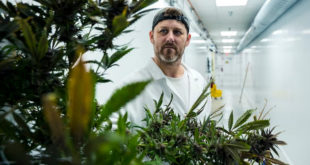
Statistics show that 2.5 million Americans are addicted to opioids. An average of 80 opioid-related deaths occur daily across the nation. Legislators around the country are working to legalize medical marijuana as they believe it is a safer and less addictive alternative to treating pain.
Neurobiologist, Yasmin Hurd, believes that marijuana legalization could reduce opioid addiction by drastic numbers, according to Quartz. Hurd is a professor at Mount Sinai Hospital’s New York medical school. Hurd believes that cannabidiol (CBD) is the ideal option for treating opioid addiction.
She said, “Epidemics require a paradigm shift in thinking about all possible solutions. The rapidly changing sociopolitical marijuana landscape provides a foundation for the therapeutic development of medicinal cannabidiol to address the current opioid abuse crisis. We have to be open to marijuana because there are components of the plant that seem to have therapeutic properties, but without empirical-based research or clinical trials, we’re letting anecdotes guide how people vote and policies.”
Cannabidiol attaches to receptors in the brain, reducing cravings for opioids for long after the CBD is ingested. Research was conducted on animals to prove it.
Hurd said, “Preclinical animal models have long demonstrated that, in addition to reducing the rewarding properties of opioid drugs and withdrawal symptoms, CBD directly reduces heroin-seeking behavior.”
The benefit of legalizing CBD products is that there are no psychoactive effects. There would be no black market, according to the professor. Some evidence does support the replacement of opioid drugs with medical marijuana working to reduce opioid addiction.
There have been fewer marijuana-related traffic deaths than opioid-related traffic deaths, a Columbia University study showed. The Columbia University research team also concluded that legal medical marijuana might lead to a reduction in prescription painkiller addiction as a whole.
The DEA is in some agreement regarding CBD for medicinal use, agreeing, to an extent, that it has medicinal uses. DEA spokesperson Russ Baer said in a statement to US News & World Report that, “From a practical standpoint, we are giving priority, actually to those researchers who are conducting research with marijuana extracts, [which] the internal code will allow us to track and prioritize. We recognize that there have been some studies that have been promising…and we want to be able to support that ongoing scientific research, particularly as it relates to marijuana extracts.”
 AZ Marijuana Arizona Marijuana Info
AZ Marijuana Arizona Marijuana Info






